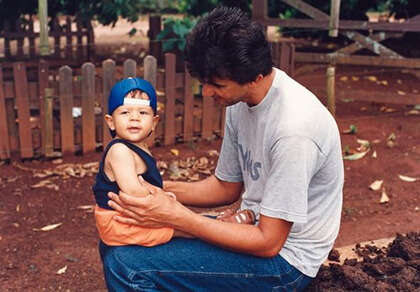 Child Custody in General
Child Custody in General
When two parents dissolve their marriage, or separate so they are no longer living together; arrangements need to be made regarding how their children are going to be raised and how access between the parents is going to be structured. If the parents are capable of working together amicably on access and child-rearing issues (which, from our office’s perspective, is usually the best outcome for both the parents and the children upon separation) the divorce decree, or the custody order, if any, does not really even need to be that specific — the parents should be able to work out any differences on their own. Unfortunately, such situations seem all too rare.
If the parents in a marital dissolution or paternity proceeding cannot agree upon a custodial arrangement for their minor children, a district court judge or referee will decide the issue. According to Minnesota’s child custody statute (Minn.Stat. §518.17), custody of the children is supposed to be awarded based upon their “best interests”.
The statute states that thirteen (13) factors are supposed to be taken into consideration, but, at the end of the day, the phrase “best interests” can seem rather ill-defined, which means that what the phrase means to an individual Family Court Judge or Referee (the decision maker in a contested case) will ultimately be very important.
Under Minnesota law there are two types of custody: Legal custody, and physical custody.
Legal Custody
Legal custody relates to a parent’s ability to be involved in decisions regarding how the children are going to be raised. The statute (Minn.Stat. §518.003) specifically defines legal custody as the right to determine the child’s upbringing; including education, health care and religious training. There are two types of legal custody: Joint legal, where both parents are allowed to participate in decisions relating to the children’s education, religious training and medical care; and sole legal, where one parent is essentially given complete authority over child-rearing issues. Minnesota law presumes that joint legal custody is in the best interests of the minor children, unless there has been domestic abuse between the parties; of if the parties are completely incapable of communicating and cooperating. In joint legal custody situations there is no presumption in favor of either party’s position on child-rearing issues, although recently the Court of Appeals has been limiting the rights of “noncustodial” parents on anything other than the specifically defined joint legal custody issues.
The Nygaard & Longe Law Office has successfully litigated joint legal custody disputes between parties.
Physical Custody
Physical custody is defined by Minnesota law as the “daily care and control” of the minor children. Similar to legal custody, there are also two types of physical custody — sole physical custody and joint physical custody. Joint physical custody does not require an absolutely equal division of time between the parents.
Instead, it is more of a legal label which governs the rights and responsibilities of the parents. Joint physical custody does not require an absolutely equal division of time between the parents.
According to Minnesota case law, joint physical custody is not a preferred custodial arrangement,and should only be awarded in the “exceptional” cases where the parties can demonstrate to the Court that they are capable of a higher degree of communication and cooperation than is presumably typically present in a marital dissolution proceeding.
We at the Nygaard & Longe Law Office disagree with the presumption against joint physical custody, and believe that the presumption should actually favor joint physical custody except in cases where one parent is unfit; but the law is what it is. We at the Nygaard & Longe Law Office are quite familiar with a variety of psychological studies and materials which, over the years, have almost universally concluded that joint custody is better for children than sole custody (see, e.g., “Children Likely to be Better Adjusted in Joint vs. Sole Custody Arrangements in Most Cases, According to Review of Research“, published by the American Psychological Association Online in 2002).
We believe that one major problem with the presumption against joint physical custody is that it establishes a system where one parent is the “winner” (presumably the mother) while the other parent is the “loser” (presumably the father). We believe that such a “winner takes all” system can only encourage conflict between the parents, especially for active and involved fathers who do not want to be relegated to the role of being a “visitor with a paycheck.”
On the other hand, given Minnesota’s current, flawed, custody system; our office has no problem whatsoever arguing for fathers to be awarded sole physical custody of their children. We believe that if the system is such that only one parent can be awarded primary physical custody, why should that parent not be an active and involved father?
Under Minnesota law there are currently two primary differences between joint physical custody and sole physical custody.
First, an old adage states that “all power corrupts, and absolute power corrupts absolutely”. We in our office believe that sometimes when a parent is awarded sole physical custody that parent can become (or remain) insensitive to the rights and involvement of the other parent. We believe that joint physical custody tends to temper that tendency. We also believe that in joint physical custody situations other individuals who have contact with the children and the parents tend to treat joint physical custodians with more respect.
Second, in a true joint physical custody situation (where each parent has the children at least 45.1% of the time during the year) the amount of child support which may be exchanged between the parties can be reduced.
Social Early Neutral Evaluations (SENEs) and Custody Evaluations
In many counties, if the parties cannot agree upon custody and parenting time they are encouraged by the Court to participate in an Early Neutrual Evaluation (ENE). The ENEs occur early on in the process. There are two types of ENEs: A Social Early Neutral Evaluation (SENE), which addresses custody and parenting time issues; and a Financial Early Neutral Evaluation (FENE), which, as its name implies, addresses financial issues.
An SENE is akin to an abbreviated custody evaluation. There are two evaluators; a male and a female, so there is an appearance of gender neutrality. At an SENE the parties and their attorneys meet with the evaluators in a session that is usually scheduled for three or four hours. During the SENE each party describes (1) his or her role in raising the children, historically speaking; (2) what he or she would prefer custody and parenting time to be in the future; and (3) any concerns that he or she has about the other parent. The evaluators then confer with each other, and then reconvene with the parties and state what they believe the outcome would be in the case if a Judge had to make a decision regarding custody or parenting time (keeping in mind that the evaluators have not performed a full-blown custody evaluation). Then, the evaluators typically explore whether, based upon their recommendations, the parties can reach an agreement on the custody and parenting time issues. If the parties cannot reach an agreement at the SENE, having a custody evaluation completed would be the next step — if the parties could afford it.
If custody remains at issue after the SENE, some parties will have a full blown custody evaluation completed. In most counties, the custody evaluation must be done privately, and paid for by the parties. A private custody evaluation can be very expensive.
The purpose of the custody evaluation is to provide the Court with recommendations regarding the custodial arrangement which will serve the “best interests” of the minor children. During the custody evaluation process the custody evaluator should interview both parents to find out their thoughts with regard to how custody and parenting time should be structured, and to learn the history of how the children were cared for. The custody evaluation may (perhaps should) include psychological testing of the parents, and maybe even the children. A custody evaluation typically takes three to six months to complete.
At the end of the custody evaluation the evaluator will issue a report containing recommendations regarding the custodial arrangements which the evaluator believes will be in the best interests of the minor children.
Family Court Judges and Referees tend to rely highly on these custody evaluations, so we in the Nygaard & Longe Law Office believe that it is very important to try to obtain the most favorable custody evaluation possible. As a result, we try to guide our clients through the process to the best of our ability and provide the clients with information regarding the issues which we, in our experience, have seen to be important in the custody evaluation process.
Gender Bias?
We at the Nygaard & Longe Law Office also believe that there is a degree of gender bias in the Family Court system with regard to the award of custody of minor children in marital dissolution or paternity proceedings. Specifically, we believe that fathers are generally at a disadvantage with regard to the custody issue, primarily based upon a belief, spoken or unspoken, that mothers are better suited to care for children. As a result, we try to offer guidance and insights to our male clients who are going through a contested custody case, with an eye towards obtaining the best results possible based upon our experience and knowledge of the law.
In addition, our office has also handled, and won, contested custody cases for mothers.

We have also obtained favorable results for mothers in marital dissolution and custody proceedings.
Site Links
Other Links
Links to State of Minnesota Statutes and Forms
Nygaard & Longe Law Office:
2588 Rice Street
Little Canada, Minnesota 55113
Telephone: 651.641.0694
Facsimile: 651.641.1947
General Questions E-Mail: info@mndivorcefordads.com
Mark Nygaard’s E-Mail: mnygaard@mndivorcefordads.com
Mark A. Longe’s E-Mail: mlonge@mndivorcefordads.com
